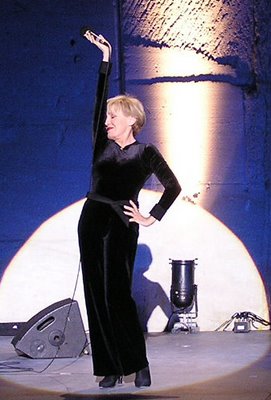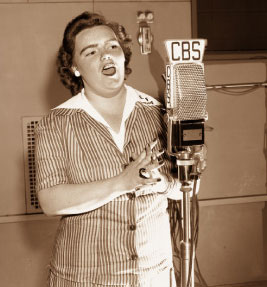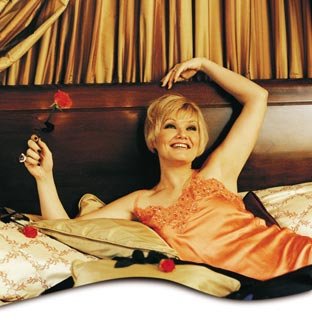Danger, Will Robinson!
That last post was extremely self-pitying and self-indulgent but I think I’m going to leave it up there as a reminder to myself and as a warning of sorts. It’s awfully easy to start feeling sorry for one’s self. A slippery slope to tread, that’s for sure.
And speaking of slippery slopes, I am reminded of a more amusing one that’s been on my mind lately: the dangerous territory classical singers tread when they endeavor to do crossover!
And yet I am dipping my own toe in these waters; I have been trying to come up with a viable cabaret act and/or one-man show. I’m still not sure if I want it to be scripted or not. One thing I am sure of is that I do not want it to be strictly autobiographical. Of course one always incorporates elements of one’s own life and experience into one’s work, and I have every intention to do so consciously. I am not the type of person who tries to hide who they are, at least not when I am onstage in front of an audience!
I have been in conversation with a director on the various possibilities open to me, and he has encouraged me to spread my net very wide, to choose music of extreme stylistic variety. My concern, of course, is doing this music justice, and not sounding like a fool, either. On the duet recital that Mark Crayton and I performed this past season, we did three numbers by the Zellnik brothers, who wrote the musical Yank! which I was lucky enough to see at the New York Musicals Festival a year and a half ago. I asked Joe and David to adapt three numbers from their catalog for two countertenors.
Not everybody was thrilled with the result, but some people liked it, and I certainly enjoyed doing the songs, especially because they were so pointedly different from any other repertoire on the program. I’ve posted one of them (called “I’m Not Afraid”) on my website. As Joe remarked after the performance, one of the songs in particular (entitled “Just True”) seemed to bring out a different facet of my voice. And I have toyed around with singing pop stuff just for kicks. I mean, I put “Autumn Leaves” (in the original French) on my demo (and my website) and indeed, preparing that piece led to a huge vocal breakthrough for me. I just do not want to sound like an emasculated crooner or an over-the-hill contralto venturing into repertoire that she should save for those quiet solitary afternoons in her salon.
Listening to Teresa Stratas’ brilliant recording of “The Unknown Kurt Weill” I was reminded of when I sang “Wie lange noch” at a benefit concert for the Champaign-Urbana Gay Men’s Chorus when I was in graduate school. I have always had a thing for that song, so much more than for the French variant, “Je ne t’aime pas,” nice though it is. It was quite well received, in fact, though I never went any further with more public performances.

The divine Nicole Croisille
As a child I was extremely snobbish in my musical tastes, but eventually started listening to more pop music, and over time I developed a few really embarrassing gaffes in my musical taste (some of the less humiliating: Dalida and Nicole Croisille — two quite different French pop princesses (I don’t need to be embarrassed of loving Piaf and Juliette Gréco), ABBA, Trisha Yearwood... Even though I’m not a fan, I have both volumes of Madonna’s Greatest Hits... I think I’d better stop before I completely humiliate myself, and reveal that I have about eight or nine Céline Dion CDs (though I haven’t bought any since that duet with Andrea Bocelli).

Karita Mattila has a very peculiar album from the mid- to late-nineties called “Wonderful” where she does, indeed, sound wonderful, but the arrangements are really wrong-headed and there are a few priceless renditions, including one of “Taas päivä kaunein on” (aka “Someday My Prince Will Come”).
I think my very very favorite crossover album was done in the mid-eighties by the ever-surprising Sylvia Sass [you have to cursor down to see the album cover; the image is write-protected or I'd post it here; and BTW, do NOT miss the fabulous Felicia Weathers record jackets, either!]. In it she sings all your favorites... in Hungarian. I gotta say, her voice sounds really comfortable in this rep; it’s some of the most unforced, relaxed singing I ever heard from her. Though there is a certain party appeal in hearing “Total Eclipse of the Heart,” “Bridge over Troubled Water” or (most especially) “Flashdance” in Hungarian. At the climactic point in that song, a rhythmic clanking sound rings out in a pseudo-disco rhythm. I used to say it sounded like the janitor who worked in the recording studio banging on a garbage can cover.
And then there is an album by that ubiquitous and overrated soprano that so many people seem to love but who, to my ear, becomes more mannered and masturbatory and self-indulgent every time she opens her mouth. Certainly her pop renditions represent a nadir in this department. On her recent pop album, I was only able to listen to a version of Joni Mitchell’s “River” that sounded like some sort of scena di pazzia before I ran screaming out of the room. So there are real dangers in taking this stuff on.
I remember listening to Leontyne’s pop album and liking it, but that was during a period of my development when she could do no wrong. I do think that, were I to hear it now, I wouldn’t beam down such unstinting approval on her rendition of, for instance, “Ich bin von Kopf bis Fuss aus Liebe eingestellt” (“Falling in Love Again”). But I guarantee that this album is head and shoulders above the horror mentioned above.
Kiri has done a lot of this stuff without humiliating herself, and there’s a really nice Flicka recording of Rodgers and Hart (I haven’t heard her other endeavors). And of course in the Old Days, there was nothing remarkable about singers taking on a more popular repertoire. Of course there was not such a huge disparity in vocal styles then, either. A friend of mine opines that one learns a lot more about these great singers in the recordings of such repertoire, where they are allowed to let their hair down.

The young (and ever-sublime) Eileen Farrell in her element
The real masters of this repertoire were some of those gals from the thirties through the fifties: Grace Moore, Dorothy Kirsten, Helen Traubel, Risë Stevens, and the peerless Eileen Farrell. God her pop stuff, even the very last recordings she made, is breathtaking. Of course at least three of these women (Moore, her protégé Kirsten, and Farrell) started out as radio singers, which meant they cut their eye teeth singing everything and everything. Turning on a dime, as it were.
I have just pulled the Thomas Quasthoff jazz album off of Rhapsody and so far it’s not bad. He of course indulges himself a bit too much in the superior quality and range of his voice (not every song needs to end on Low Q just because he can do it, but he has a great feel for the material. His English is mostly excellent; he sounds kind of like a Dutch person (which reminds me, I haven’t even mentioned Elly’s crossover albums, but that will require a separate posting). I might even buy this one. Of course, I adore him; he can do almost no wrong in my book, just like the nameless soprano referred to above can do almost nothing right. Yes, I am a person of extremes, which is why I need to be proven wrong on occasion (although I am completely correct in these two instances).
Next time I’m going to write about the two crossover albums I got today, which sit on opposite extremes of the continuum: Jorma Hynninen and Gérard Lesne. Stay tuned because it was quite the roller-coaster ride listening to these two!
Labels: crossover, dorothy kirsten, eileen farrell, helen traubel, karita mattila, sylvia sass, thomas quasthoff, zellnik


0 Comments:
Post a Comment
<< Home